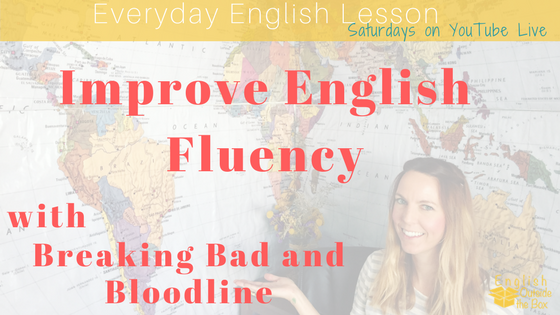
Improve English Fluency with Breaking Bad and Bloodline
Have you ever watched a TV show that you just couldn’t get enough of? If you can’t get enough of something, that means you really like it and want a lot of it or a large quantity of it.
Have you ever been so hooked on (*so interested in*) a TV show that you wanted to binge watch the whole season? When you binge watch something you watch many episodes in a row at one time, usually for at least a few hours.
There have been a few shows like this for me, and I am not ashamed to say that I binged watched them all! Why am I sharing this with you this week? Well, the great news is that you can enjoy my favorite shows too, and improve English fluency at the same time! So how is that possible?
Watch this week’s “Everyday English” lesson to review how you can learn English and improve English fluency with some of my favorite TV shows, “Breaking Bad” and “Bloodline”
Improve English Fluency with Breaking Bad and Bloodline
It’s obvious that you will improve your listening skills when you watch TV shows and movies in English. If you turn on the subtitles, you can actually improve some reading skills as well. However, how (exactly) can you build your vocabulary, get more focused listening practice, and improve your speaking skills?
Let’s review!
BUILDING VOCABULARY
When you watch your favorite TV show, or my recommendations in this lesson, you can have a blank piece of paper and pen ready to write down new expressions and words that you hear. This will allow you to hear new words in context, in a sentence, and help you better understand how you can use the words and expressions later.
This could be difficult, though, since you’ll be more focused on writing things down than on paying attention to the actual show. So what if you had a worksheet with a lot of the new, challenging vocabulary words before you watched the episode? If you are able to read through vocabulary before you watched, you would have an easier time understanding the show and you could pay more attention to the story!
I have that worksheet for you today, in this lesson! In fact, I have 2 worksheets for you with today with 80 vocabulary words to learn and review. The first TV show worksheet is from the pilot episode of Breaking Bad, and the second is from season 1, episode 1 of Bloodline.
Enter your name and email so I can send you are TV worksheets!
When you download the worksheets you can start reviewing the new words so you’re ready to watch the episode for easier understanding. The worksheets include challenging words (straggler, basket-case, prick….), idioms (to have the green light, to be in the hole, lay your eyes on, etc…) and phrasal verbs (dime on someone, shut someone out, suck back in….).
MORE FOCUSED LISTENING PRACTICE
In addition to learning vocabulary with TV, you can get more focused listening practice with comprehension questions about the episode. Comprehension questions can check your understanding of the general plot and storyline, and also see if you understand English sarcasm, irony, and the use of English rhythm and intonation to understand what the actors really mean.
Comprehension questions can be multiple choice, true or false, or open-ended questions allowing you to describe what you saw and understood.
An example comprehension question from the first 2 episodes are:
Breaking Bad: In the opening scene, what does Walter White do with the camera?
Bloodline: Why are many friends and family members at the hotel that particular weekend?
*Remember, your free download (2 TV worksheets) in this lesson will give you 18 total comprehension questions*
IMPROVE YOUR SPEAKING
Similar to comprehension questions, discussion questions about the episode, the plot, and the characters are a great way to improve speaking skills!
When you finish watching the episodes, talk about the show with a friend or conversation partner. If your partner watched the episode with you, you can talk about what the characters did, why they did it, and make guesses about the future episodes.
You can also try and connect the episode to your life, can you imagine doing anything that you saw in the episode? Do you know anyone who acts in a similar way?
If you want these questions created for you, before you watch the episode, then don’t worry I have the free worksheets for you to download!
If you haven’t downloaded the free worksheets yet, then you can right here:
Until next time,
Happy Studying! ♥
If you know someone studying English, can you share this lesson with them? It’s easy with the buttons, below!
The Conversation Club will provide you with 6 group conversation calls to practice with a real teacher and a group message community to connect with other members.
You will also get weekly English lessons to help your vocabulary, listening, reading, pronunciation, and more!
Try the Club for 1 week, free! Join the 1-week free trial here.

I love TV shows! I’m watching Gilmore Girls and the Crown =D
I wrote a similar blog post! Improving your English is so much more fun when you’re binge watching a show you love. Great blog post. 🙂
Wow Jennifer – what fantastic work. I just had to download a copy of the worksheet. I might try it out in a lesson. Funnily enough, even though I watched all 5 seasons of Breaking Bad, I never saw the pilot episode. It’s supposed to be amazing.
As much as I believe that it’s the words students already know that cause the most problems due to connected speech, weak forms etc, it’s true that series are full of unknown vocabulary. I like that you’ve done the hard work for your learners of giving definitions of all the new voab. Nice one!